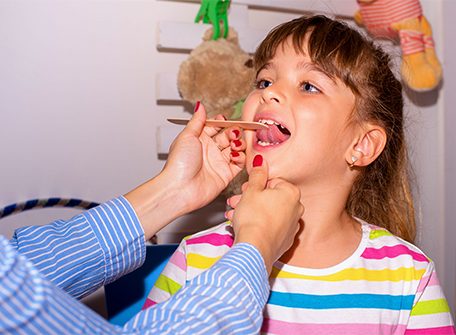Dysphagia refers to difficulty in swallowing. When swallowing, food or liquid cannot pass easily from your child’s mouth, down the esophagus, and into the stomach.
Why do Children have Dysphagia?
There are four stages to swallowing. When either one of these phases doesn’t go right, swallowing problems develop. This is known as dysphagia (chronic dysphagia). This can develop suddenly or gradually.
Your child may have something stuck in the esophagus if they have swallowing issues suddenly and they are normally healthy. An infection may cause your child to have trouble swallowing and fever. Other conditions may cause your child to experience chronic swallowing difficulties.
What are the Risk Factors for Dysphagia in Children?
A child is more likely to experience swallowing difficulties if they suffer from the following health conditions:
- Premature birth
- Lips or palates with a cleft
- Other body parts compress the esophagus
- Problems with the teeth, such as an overbite
- Delayed development
- Nervous and muscular disorders
- Asthma of the esophagus is called eosinophilic esophagitis
- The disorder of gastroesophageal reflux (GERD)
- Stuck foreign objects such as coins in the esophagus
- Tracheostomies are artificial openings in the throat that allow for breathing
- Having a big tongue
- Tonsils that are large
- Long-term use of a breathing machine (ventilator) can cause oral sensitivity or vocal cord irritation
- Symptoms of abnormal development of the skull and nasal structures (craniofacial anomalies)
- Digestion problems
- Vocal cord paralysis
- Masses or tumors in the throat
In Children, What are the Signs of Dysphagia?
Each child may experience a different set of symptoms. Some examples are:
- During feedings, the body arches or stiffens
- When you drink or eat, you experience chest congestion
- Whenever you eat or drink, or right after, you cough or choke
- Feeling drooly
- Slowing down when eating
- A feeling of stuck food or liquids in your esophagus or throat, or a lump in your throat
- Feeding while gagging
- Infections of the respiratory system frequently
- Inability to swallow or sucking problems
- A lack of alertness or irritation during feedings
- During or after a meal, you have a wet or raspy voice
- Losing weight
Other health problems may present symptoms similar to those of this condition. Consult your physician for a diagnosis.
Can Dysphagia Cause Complications for a Child?
Aspiration can result from this condition. Your child may experience this when food or liquid enters their windpipes and lungs. Lung infections can occur as a result.
Dysphagic children may not be able to eat enough food. They may become malnourished. Growing properly may be difficult for them.
Dysphagia can result in long-term complications for some children. They may not be able to swallow as well as they used to. A child who is also dealing with other health problems, like nerve or muscle problems, is more likely to have this problem. Others may learn to get proper nutrition. Consult your pediatric doctor for more details, who might often refer to a consultant for dysphagia therapy.
How is Dysphagia Treated in Children?
Your child’s symptoms, age, and general health will determine the treatment. Dysphagia can also be caused by a severe condition or by something else.
The esophagus may be infected or there may be an object lodged there.
A piece of food may have become stuck in your child’s esophagus if their swallowing issues begin suddenly. An infection may cause your child’s difficulty swallowing and fever. Each of these symptoms is an emergency. The symptoms should be treated immediately.
Chronic Dysphagia
Speech or occupational therapy may help your child if he or she is suffering chronic dysphagia. Exercises and eating techniques will be taught to help your child swallow better.
Perhaps your child cannot swallow thin liquids as well as thick liquids. Providers may recommend that your child is given baby food or pureed foods. Babies who struggled to swallow formula or breastfeeding may find that baby foods helped.
Dysphagia with GERD
You may be able to help your child swallow better if he or she has GERD (gastroesophageal reflux disease). Having a less irritated esophagus and throat may make them work better. Medicine or feeding changes may be used to treat GERD.
Esophageal Stricture
When a child has a scar or narrowing in their esophagus, a test may be necessary. An esophageal dilation involves the health care provider widening your child’s throat. The procedure will require your child to be anesthetized. This procedure may have to be repeated on your child.
At Hope AMC, we offer dysphagia therapy, stuttering therapy, swallowing therapy. The focus of our treatment is usually on oral motor strategies that promote breath control, sucking, swallowing, and chewing abilities.
For more details, contact us at Hope AMC




